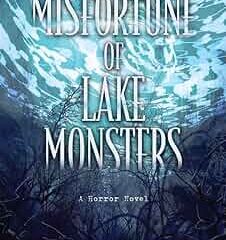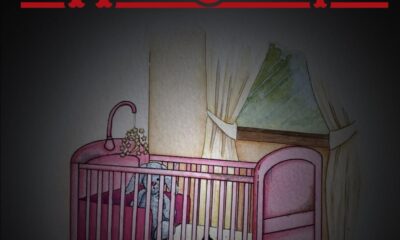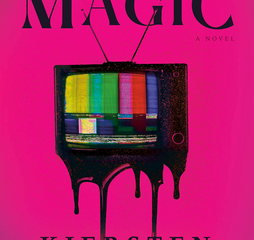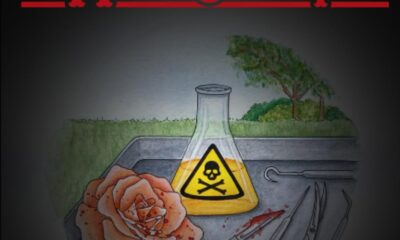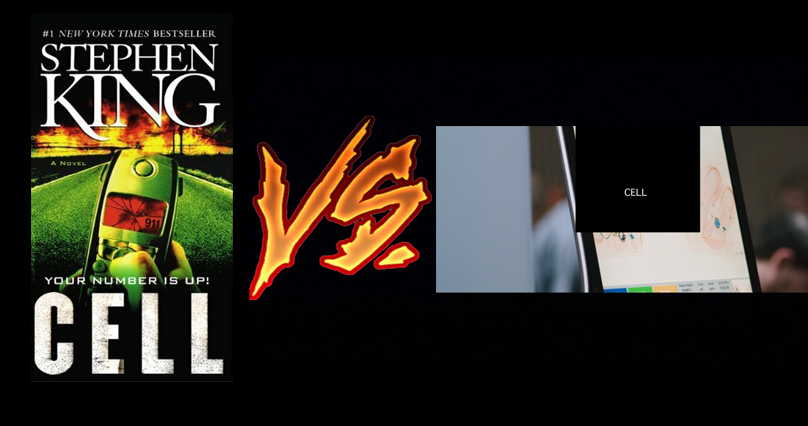
Cell VS. Cell
More Videos
Published
3 years agoon
By
Audrey III
Cell is that Stephen King book and movie that everyone forgets is a Stephen King book and movie. It might be because when you think of Stephen King you don’t usually think of zombies, and when I think of Cell I don’t necessarily think of zombies either. Whether or not Cell is really part of the zombie horror genre, I leave that up to you the reader to decide.
Cell – A Book
Clayton Riddell is an unassuming graphic artist who’s on his way home from Boston after landing the deal of a lifetime to publish his own graphic novel. Unfortunately for him, this is the day that “The Pulse” happens. The Pulse is an entirely phone based event where anyone who’s on their phone at around 3 in the afternoon on October 1st sometime in the mid-2000s gets their mind wiped causing them to suddenly and violently go crazy. Mass murder and mass panic ensues. As hysteria reins and people try to call for help more get hit by the Pulse and the Apocalypse begins.
Clay, who’s cell phoneless, avoids the Pulse, but from his vantage point on a random Boston street corner, things go downhill fast as “phone crazies” attack and kill people all around him. During the initial chaos Clay manages to save a gay guy named Tom McCourt, who joins him for the rest of the book for lack of anything better to do. Eventually they also pick up a traumatized 14 year old girl named Alice.
Fleeing Boston as it burns, our mains become refugees in the cell phone Apocalypse. Clay’s main objective is trying to get home to his wife and son Johnny G (they must have been really big fans of Kenny G is all I can think), Tom really wants to check on his cat, and Alice is mostly just coming along with them since she had to kill the only family she had apparently. They meet other “normies”, none Pulse affected people, along the road, and it is a very long road. There might be more walking in this book than in the whole ten seasons of The Walking Dead combined.
The phone crazies aren’t your typical “brainssssss” zombies. They might bite and stab, but they’re not after your juicy human meats. After the initial homicidal panic from the Pulse, they quickly start to change and evolve into something entirely different. You learn how all this happens from a 12 year old character in the book named Jordan, who apparently can figure all this out because he knows computer basics. As the phone crazies go from individual threats to a hive mind, Clay and his band become targets of the phone crazies new world order.
Thoughts – An effort was made
This book, more than anything else, feels downright frustrating. From the big flashing TECHNOLOGY BAD sign throughout it, to the one note characters, to the lack of clarity into just how the Pulse happened, and the halting pace of the entire book where things start to pick up only to slow down again to mourn for characters that you don’t really care about all that much about. Clay is not a very interesting main character to spend an entire book with. His one and only concern is to get home to his wife and son; no thoughts for other family, friends, coworkers or the greater effect the events that are unfolding around them are going to have on the future. As eager as Clay is to get home though, there are so many detours that slow the whole book down that at times it seems like the book is trying to replicate a phoner in reboot mode. As much as the book tries to push the found family trope it falls flat in that effort too. Despite spending time getting to know random characters, the fact remains that these were people Clay met only a hour to a day or two ago, so any real connection between the characters is somewhat lost.
The beginning of the apocalypse here, which takes at least 100 pages, could be the same as any typical zombie or plague movie or book (think World War Z on a local level only with the most average guy ever instead of Brad Pitt). It’s not until the phoners start changing to something other than mindless zombies that things really get interesting. The characters actually start to have some doubts and moral dilemmas about the mass killing of beings that used to be human, but may not be any longer. The problem is, things also get so convoluted and motivations of the phoner hive mind remain so dim that the big climax and the ending of the book feels supremely unsatisfying as a whole.
The book may hold more disappointment for me than enjoyment, but it’s not the worst book I’ve ever read, nor even the worst Stephen King book, but it’s still not ranked anywhere near the top of my Stephen King must read list.
Cell – A Movie
This may be a rare instance where a movie is actually better than the book it was based off of. Perhaps it’s because the movie trims all the unnecessary fat and characters from the book to fit it into its hour and a half running time, but the entire premise seems to work better as a movie. The screenplay is still written by Stephen King and Adam Alleca, and the plot is basically the same as the book, with a few key differences.
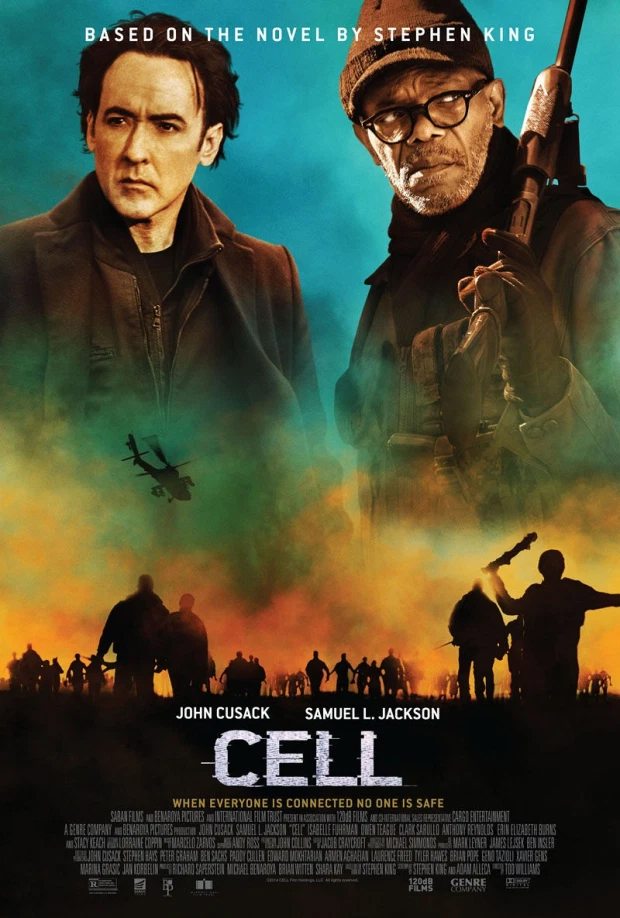
Clay in the movie is played by the ever pleasant and sad eyed John Cusack, who brings a real feeling of humanity to the character of Clay that was lacking in the book. Clay’s still a graphic artist on his way home to his estranged wife and son, only now the phone Apocalypse starts for him in a Boston airport, which is a much more exciting start than a random street corner.
Escaping the chaos at the airport for the subway, Clay runs into the movie version of Tom, played by Samuel L. Jackson, who bears pretty much no resemblance to Tom from the book. Movie Tom is now a subway driving, Vietnam vet, devoice who, like Clay, is caught up in everything going on. To the movie’s credit, there is a throwaway line that Tom is still gay, even if it’s blink and you’ll miss it. Tom has Clay’s down to earth attitude about the end of the world and it’s easy to understand why they might stick together this time around. They also find their own traumatized Alice Maxwell, played by Isabelle Fuhrman.
Perhaps the biggest change from the book to the film is the sense of solitude the survivors experience while heading north. Wide shots of isolated cell phone towers in nature add to the feeling, and the low budget independent film look of the movie makes for some realism in a way that World War Z or the Dawn of the Dead remake lacks. When the leads do run into other normies, instead of the stereotypical Stephen King crazy religious ladies or redneck yokels from the book, you get some likeable average Joe type people who are willing to help Clay’s crew out. Even character deaths of one-off characters in the movie seem to hold more weight than they do in the book.
The phone crazies powers are trimmed down from the book as well, and at the same time become much scarier when they start admitting the Pulse (which sounds a lot like an AOL dial-up tone) from their mouths in order to infect remaining normies. At that point it becomes a survival of the fittest species type movie.
After King changed the ending for the movie from the book because of criticism of the book ending, the movie ending is still just as confusing. While the book’s ending is a bit more on the hopeful side, in general I still preferred the new movie ending to the book ending.
But seriously, don’t ask me what’s going on here cause I haven’t got a clue.
Final Girl Thoughts
If you’re the type of person who needs every plot point explained in great detail, this is definitely not the book or the movie for you. If you like your apocalypses more on the confusing side, then you might enjoy Cell. There’s some of the typical Stephen King unusualness that happens, the shadowy figure haunting the mains every step (this time called the Raggedy Man or the President of Harvard or the President of the Internet, whichever you prefer) and characters having psychological breakdowns on the regular. Cell, both the movie and the book, definitely have that Stephen King mark on them, though they perhaps lack the deeper themes that make for a real Stephen King classic. My recommendation, watch the movie for free on Tubi and skip the book entirely.

You may like
Released in May of this year, You Like It Darker is the latest short story collection by Stephen King.
In the afterward King says. “You like it darker? Fine, so do I.” This sort of declaration might lead one to believe that this collection is going to be darker than his others. That we might reach depths of horror that we haven’t yet seen before, even from the King himself. This is a promise that this book does not deliver on. But that isn’t to say that You Like It Darker wasn’t still a damn fine read.
The good stories
The first story in the book, Two Talented Bastids, started everything out on the right foot. This is the story of a man named Mark. Mark looks after his father, who he lovingly calls Pop. Pop is a famous author His best friend, Butch, was a famous painter before he passed.
Everyone wants to know how two men who are lifelong friends suddenly become famous in their forties. But as far as the men in question are concerned, they’re just two talented bastids. That is, until Pop dies, and leaves a story to explain to Mark how one fateful hunting trip changed their whole lives.
Another tale I appreciated was Rattlesnakes. This is a sequel to the classic King novel, Cujo. If you haven’t read Cujo, this will spoil the ending for you. I, for instance, had not read Cujo.
Rattlesnakes is about Vic Trenton. A recent widower, he’s traveled to Florida to heal from his losses. There, he meets a lovely woman about his age (old) who appears to be not quite right in the head. She walks around around town like Delta Dawn, not with a suitcase in her hand but wheeling a twin stroller. Years ago, her twin sons were killed by rattlesnakes. And she’s never really gotten over that. So she wheels around the stroller and pretends they’re still in there. At least, everyone assumes she’s pretending.
Easily my favorite story in the book was Danny Coughlin’s Bad Dream. Imagine if you had a prophetic dream, but just one. That’s exactly what happens to Danny. He dreams of the location of a murder victim. When he goes to the location, which he’s never been to before, he finds the poor woman in question. Of course, the police find this extremely suspicious. And one detective grows so suspicious that he starts taking matters into his own hands.
The bad stories
Of course, not all the stories can be great. One that I especially disliked was Finn. This is the story of a young man with bad luck. I mean, terminally bad luck. So bad that he’s kidnapped in a case of mistaken identity.
This story just didn’t have a satisfying ending. Nor did it have a satisfying middle. There was just no real conclusion.
Another story that missed the mark was On Slide Inn Road. It’s the story of a family on a car trip to see a dying sister when they’re overtaken by some rough people outside of an old abandoned inn. This story also doesn’t seem to have any sort of cohesive storyline. It’s just the story of a family having a really bad day. It doesn’t go anywhere.
Overall, this was a collection that shows King’s patterns. He writes over and over about men who have lost their wives and their sons. Men who have survived their families and been left alone. Most of the main characters in these stories fall into that category. Perhaps in that way, these stories are darker than the ones King has written in the past. At least for him.
Fans of King’s work will love this book. I loved this book. I loved catching up with the lonely widower from Cujo. I loved meeting monsters who might or might not have crawled out of the back of a Buick. And while none of these stories were dark enough to disturb my sleep, they were good enough to keep me up reading late.

As summer approaches, there’s nothing quite like reading a book with warm campy vibes. It’s especially true if you’re lying on a sunny beach. Nicole M Wolverton’s A Misfortune of Lake Monsters matches that picture perfectly. It’s described as a creature feature with a Stranger Things-esque friend group.
Although set in modern times, I found the story felt like something out of the 80s (in a good way). Character dynamics reminded me of The Goonies and IT while the narrative combined just the right amount of adventure, romance, and horror to bring out nostalgia and comfort at the same time. Anyway, let’s dive (hehe) in!
Plot
Lemon Ziegler has one aspiration in life – to become a vet. Unfortunately, that would involve leaving her hometown, which is a problem as she is obligated to continue the family business. While such a situation is not out of the ordinary, the business itself definitely is. Lemon must impersonate Old Lucy, the town monster (a nice homage to the Loch Ness myth).
The decades-old legend about this creature swimming around in the lake is keeping tourism in the town alive. Because of this, poor Lemon has no other choice but to follow in her family’s footsteps. She keeps this secret from everyone, including her best friends, Derrin and Troy. The latter is harbouring feelings for Lemon that are stronger than friendship. As he is a teenage boy though, he is too afraid to make a move (much to Darrin’s enjoyment).
Things take an unexpected turn when a real monster shows up, hungry for blood. As one could guess in these kinds of stories, no one believes Lemon at first. This only allows the creature to claim more victims (and yes, I feel the saddest about the poor dog). Once the adults finally decide to do something, it alerts the FBI, which makes the situation more difficult for our gang. Unsurprisingly, they are the only ones who can stop the monster from wreaking move havoc.
In the midst of the riveting adventure, we also see Lemon go through a character arc. She stands up to her grandfather, allowing him to see her as an adult for the first time ever. There’s also the blossoming of her and Troy’s romance. The pair awkwardly navigate the transition from friendship to romance in an adorable way. At its heart though, this novel is about family, blood or otherwise, and how strong connections can sometimes be the only way to save your life. After all, who could defeat a multidimensional monster by themselves?
Overall thoughts
I had a blast with A Misfortune of Lake Monsters as it combined all the components of making an effective adventure story with enough heart to make you care about what happened to the characters. They are sympathetic yet entertaining and their relationships feel organic down to the dialogue that, while a tad cheesy, is oozing with charisma.
The reasons I am giving it four stars are more individualistic. I tend to go for a darker type of thriller/horror and this story, although not short of gore, ultimately steers in a more heartwarming direction. It’s something I anticipated knowing the age range and found fitting with what the narrative was going for.
I also would have liked a slightly different as I feel the story entered more of a sci-fi subgenre in the last third. While that’s fine overall, it is not my first choice of horror. Considering these things are more down to my personal preferences as a reader, I would absolutely recommend this book. I’m excited to see what the authors does next!
 (4 / 5)
(4 / 5)
Dear readers, the time has come for some answers. At least, that’s what the teaser for the new installment of Monastery says. As usual, it delivers what it promised and more as we untangle the past and its connection to the present. Without any further ado, let’s talk about it, shall we?
Plot
We start the episode with a blast from the past. Cassandra and Celeste (Nicole’s aunt and Arthur’s lover for those with short-term memory) are in the hospital because of Celeste’s pregnancy complications. Cassandra promises her former best friend that she will ruin her all the while we find out Francis’s real parentage. The picture is finally starting to come together.
As we are back in the present day, our group is more scattered than ever. Thomas is his father Walt’s prisoner while David is still running around looking for Rocky. Fred on the other hand is just looking for any place to crash, homelessness and all. Our dethroned beauty queen Nicole is hiding away from everything – including her shame. Last but not least, little Henry is spending his time taking care of Nana Beth. Guessing that is his redemption for trashing all the evidence of Albert’s murder gathered so far. Although frustrating, his actions are understandable – the poor kid is traumatized and just wants some peace.
George Turner’s murder is still an active investigation. It is obvious that this cover-up wasn’t nearly as successful as Albert’s. I sure as hell hope that Francis gets his comeuppance sooner rather than later. Not particularly because Turner didn’t deserve it but so the rest of the characters would be safe from him. Although as I’ve said before, his clear descent into sociopathic tendencies is kind of fascinating to watch.
We also get an interesting development in what so far has been a tiny background detail, which is the Monastery Werewolf. As the creature comes to visit Rocky, we find out our resident star dog considers it family. Not going to lie, it took me a few reads to understand what this means. Now I’m getting all sorts of ideas as to how the supernatural ties into the rest of the story.
Speaking of the supernatural, it is none other than Madame Witch who frees Thomas from his captivity. Well, her contribution is indirect as she sends his best friend Alfie to help instead. Although I’d say currently the two should set their dynamic status to ‘it’s complicated’. As soon as he’s free, Thomas is immediately back in his detective mode. For arguably the first time he gets some real answers as we find out the whole backstory of Albert/Celeste/Cassandra triangle. I won’t go into details as that trio deserve their own article but let’s just say it gives Cassandra a big ass motive for killing her husband. Not to mention the way she took Francis from Celeste was quite brutal to read.
We reach the lead-on for the grand finale as David and Henry are coming to free Rocky. This naturally comes with a condition – they must hand Francis the key they found during the investigation. Little do they know Nicole is already there being held at gunpoint. Oh, and Fred should also be around somewhere as he was sleeping there the night before. Thomas might be a little late to the party since he and Alfie are held a knifepoint by Rick (seems like a running theme here). Nothing good can come from this.
Overall thoughts
This episode does a perfect job of setting up the big finale. It reveals everything we need to know except the main question – who killed Albert? At this point, while it of course still matters, this story is so much more than that. It’s about all the mess that this family has got themselves into, how with each mistake they kept digging deeper, and how it took a whole new generation for all of that to come up to the surface. I can only hope our investigative gang will make it out alive…

More thoughts from the author:
1. Although a minor character in comparison, Walt strikes me as someone who’s there to represent the themes of Monastery – someone who will do horrible things in the name of family. What was your intention with his characterisation, especially considering he works for justice (aka the police?)
This is why I will always defend my decision to have a large cast, as opposed to most books – when you get even the slightest sense of fleshing out a minor character, it feels so rewarding. Walt, to me, takes the crown of “father of the year”, even if he does it by locking his son up in the bedroom. He is protecting his wife’s secret, protecting his son’s innocence, and doing so by going against his core ideals – i.e., a detective covering up a murder. He’s also based on a favourite uncle of mine, so it makes me happy to give him his moment to shine.
2. Something I thought of while writing this review – the cover up of George Turner’s murder seems to be a kind of juxtaposition as to how neatly Albert’s was since the police keep discovering evidence left and right (and how Francis doesn’t particularly seem to care). Was this intentional on your part?
It all adds up to plot convenience, and I have no shame in admitting that – Albert’s murder was so neatly covered up because I needed it to go unsolved for 14 years, whereas the reader knows who killed George, so there is no need for the cover-up to be well done.
As for Francis’ reaction to the murder, he started out anxious and paranoid after the fact, but he has grown into a state of not caring, which further depicts his descent into darkness – he knows he’s close to his goal (of finding the money and leaving his family), so there is a sense of invincibility taking over. He is stepping into his main villain energy and we are here for it!
3. Alfie has been yet another background character until now and yet he is the one who rescues Thomas. To me he seems like the friend who genuinely cares for Thomas and who gives him that reality check he sometimes needs to get out of his own head. Was that at least partially why you chose to bring him in for the grand finale?
Fun fact: Alfie was originally a series regular. However, halfway through writing the series, I realised I wasn’t using him as much as I’d wanted to, so I bumped him down to recurring. But the original plan always saw him and the other regulars coming together for the big climax, which is why he is in the fold. Alfie is someone who keeps Thomas grounded (if not humbled), since Thomas has the slight tendency to, well, think he’s better than everyone else. What’s coming up for them is one of the most exciting things I’ve ever written about.
4. Lastly, it’s not so much a question but rather a well done for how you crafted the Albert-Celeste-Cassandra dynamic! I was very invested despite knowing the outcome. Weirdly enough, while hating Cassandra for how she handled it, I sort of understood why she thought that Celeste deserved it? Either way, congrats for managing to craft these love stories in the midst of all the murdery goodness.
Thank you so much. As I’ve said before, romance is not my strong suit, but I do love a soapy triangle – and if it ends with gun violence, even better! The reveal of this mystery is probably my favourite sequence in the series so far.


